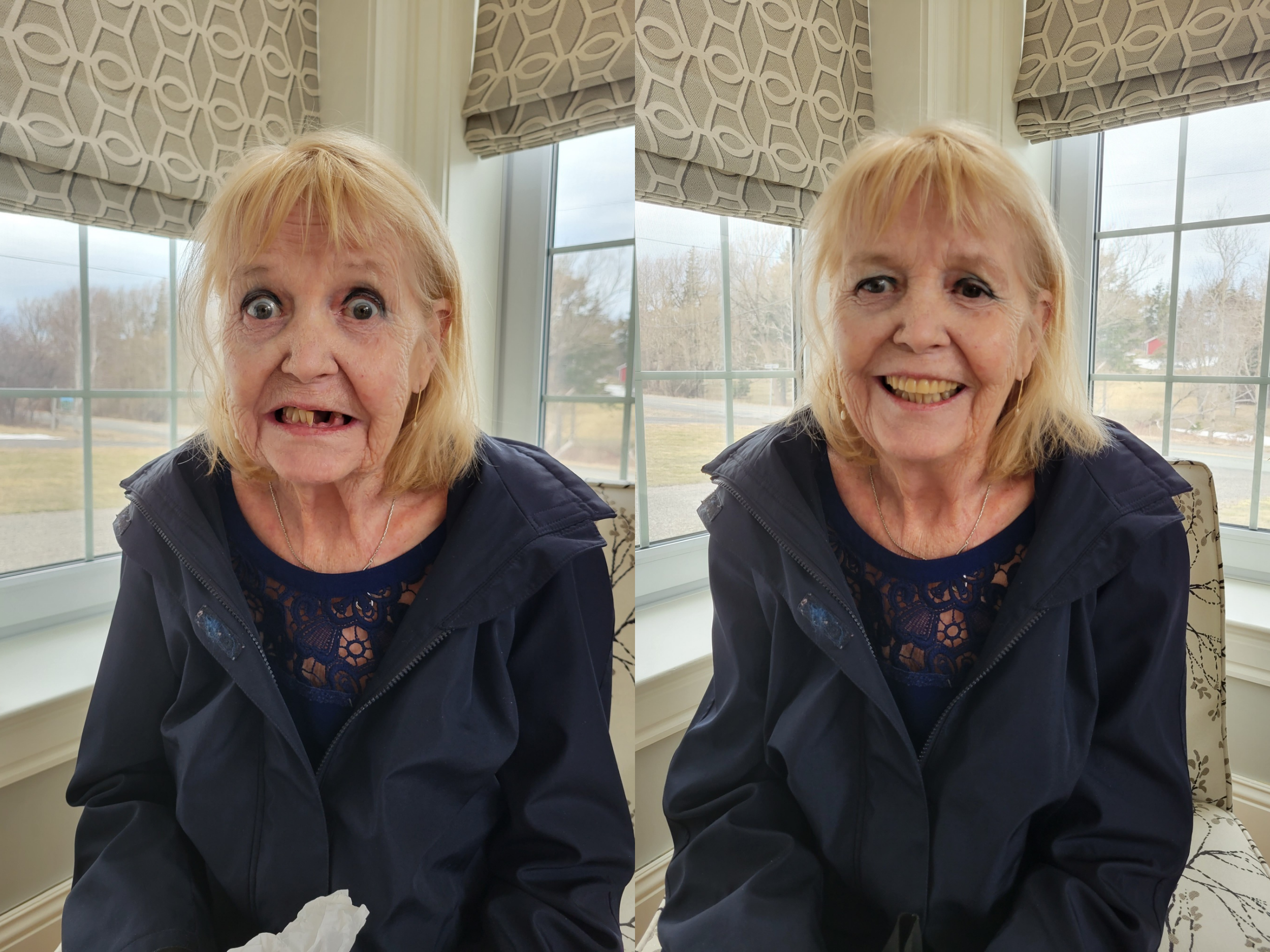Cecilia McRae and Gladys MacDougall (centre) receiving the Vision Award for Bright Smiles at our 2025 AGM with President & CEO Starr Cunningham and Board Chair, Morgan Manzer. Photo: Stoo Metz
When Cecilia McRae first answered the phone call about a woman suffering from a massive facial infection, she had no idea it would become a life-or-death situation. The woman’s face had swollen to the size of a baseball – an abscess caused by untreated dental issues. Cecilia immediately referred her to a local dentist, who sent her to an oral surgeon, who in turn rushed her to the Oral Surgery Department at the QEII Health Sciences Centre in Halifax.
“They don’t normally keep patients, but they kept her,” Cecilia recalls. “She told me she was writing her will. She thought if the infection reached her brain, she wouldn’t survive.” Thankfully, the hospital team changed her medication, drained the infection, and saved her life. Months later, the woman called Cecilia to say: Your program saved my life.
This is the power of the Bright Smiles Project – an initiative founded by Cecilia and supported by volunteers Clarence Deyoung and Gladys MacDougall – to bridge the gap in dental care for individuals who can’t afford it, many of whom are living with mental illness and/or addiction, on income assistance, or facing other systemic barriers to care.
Through the generous support of the J&W Murphy Fund, the Mental Health Foundation of Nova Scotia is proud to be the lead funder of Bright Smiles. “Some of the most touching testimonials we receive come from Bright Smile Project participants,” says Starr Cunningham, President & CEO of the Mental Health Foundation. “Just like the one in our Community Report that reads, ‘Two things I was not expecting – a sore face and back from smiling so much and standing up taller!’”
The idea for the Bright Smiles Project came from a deeply personal place. Cecilia had a loved one living with a mental illness who was able to afford dental care, but it made her wonder: What about everyone else who can’t?
“I woke up one morning and said, ‘I need to do something for the people who don’t have the means to go to the dentist,’” she says. She had heard too many stories of people going to the ER with dental pain only to be told they needed teeth removed but having no way to pay for it. They’d leave with temporary relief from antibiotics, but the root cause – untreated dental decay or infection – remained. “They’d go home and cry,” she adds. “They couldn’t afford to fix the problem.”
Determined to create change, Cecilia began connecting people with dental professionals willing to donate their time or offer reduced fees, coordinating care between dentists, oral surgeons, and even emergency departments.
One client, a survivor of childhood trauma who has lived for years with anxiety and depression, says the Bright Smiles Project gave them more than dental work, it gave them confidence and a renewed sense of self.
“I sought help for my mental health and found a way to brighter days,” they shared. “But many of the medications that helped me also caused dry mouth, which contributed to severe tooth decay. Over time, I started covering my mouth to hide my teeth. Dental care was simply out of reach on a small disability income.”
After connecting with Cecilia and learning they qualified for help, everything changed.
“It restored my faith in the generosity and goodness of people. With the compassionate care I received, I found pride and self-esteem again. I can’t stop smiling. I can’t believe the reflection I see in the mirror. This program changed my life.”
What began as a grassroots effort has evolved into a community lifeline. The project works closely with mental health professionals, emergency rooms, and caseworkers to identify individuals most in need. Most participants are referred through Community Services, including Income Assistance and Employment Support, while others are low-income earners or receive Canada Pension Disability. Many are connected to the Department of Opportunities and Social Development and face significant financial barriers to care. The program has primarily served adults from Pictou County, Antigonish County, and surrounding areas – people who would otherwise be unable to access essential dental services.
Before and After: A Bright Smiles participant. Photo: Submitted by Bright Smiles
Today, the Bright Smiles Project is actively supporting 21 participants, though the need is far greater. To date, more than 500 people have been connected to dental offices through the program’s efforts and now have an established place for future treatment.
“The demand is huge,” Cecilia says. “Even with the new federal dental care program, not every office is accepting new patients.”
The recent rollout of the Canadian Dental Care Plan has helped ease some of the pressure. Under the federal program, low-income Canadians can now access essential dental care at no or reduced cost. While not all clinics are fully on board yet, the program has made it easier for individuals to get coverage and begin addressing years of neglected oral health.
“It’s taken a load off,” Cecilia admits. “Now, Community Services helps pick up what the federal plan doesn’t cover, and people are starting to get the help they need.”
Still, Cecilia emphasizes that advocacy and coordination remain critical. It’s not just about handing out dental cards—it’s about walking people through the system, ensuring appointments are made, and supporting them through what can often be a complex and overwhelming process.
Dental care is often seen as separate from overall health, but Cecilia and her team know better. “We’ve seen infections that could’ve turned fatal. We’ve seen people hiding in shame, afraid to smile, unable to eat properly,” she says. “This isn’t just about teeth. It’s about dignity, health, and quality of life.”
Stories like these are what keep her going. “That’s why we do this,” Cecilia says.
The Bright Smiles Project continues to grow, driven by compassion, persistence, and a strong belief that everyone deserves access to basic healthcare, including dental care. This year, the program was honoured with a Vision Award at the Mental Health Foundation of Nova Scotia’s Annual General Meeting in July—recognition for its outstanding contribution to the mental health and well-being of Nova Scotians.
Thanks to new partnerships, federal support, and a growing network of allies, Cecilia hopes even more people will be reached in the months and years ahead.
“We’re not done yet,” she says with a smile of her own. “There’s still work to do.”
This story was first published on September 30th in the Chronicle Herald’s Senior Living column.


